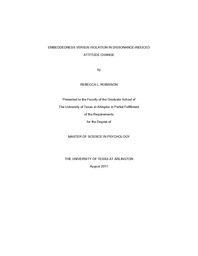
ATTENTION: The works hosted here are being migrated to a new repository that will consolidate resources, improve discoverability, and better show UTA's research impact on the global community. We will update authors as the migration progresses. Please see MavMatrix for more information.
Show simple item record
| dc.contributor.author | Robinson, Rebecca L. | en_US |
| dc.date.accessioned | 2011-10-11T20:48:12Z | |
| dc.date.available | 2011-10-11T20:48:12Z | |
| dc.date.issued | 2011-10-11 | |
| dc.date.submitted | January 2011 | en_US |
| dc.identifier.other | DISS-11328 | en_US |
| dc.identifier.uri | http://hdl.handle.net/10106/6145 | |
| dc.description.abstract | The argument is made that embedded and isolated attitudes differ in the magnitude and effects of cognitive dissonance in an induced-compliance paradigm. Individuals who engaged in counterattitudinal advocacy with an embedded attitude experienced increased negative affect but decreased attitude change compared to those who engaged in counterattitudinal advocacy with an isolated attitude. Traditional choice condition effects were also found to be different when the attitude was embedded versus isolated, with the embedded attitude characterized by a reversal of the expected effects typically seen with isolated attitudes. It is argued that induced-compliance dissonance studies have historically been restricted to one-sided isolated attitudes and it is suggested that to better understand the overall effects of cognitive dissonance, the range of attitudes studied may need to be expanded. | en_US |
| dc.description.sponsorship | Levine, Daniel S. | en_US |
| dc.language.iso | en | en_US |
| dc.publisher | Psychology | en_US |
| dc.title | Embeddedness Versus Isolation In Dissonance-induced Attitude Change | en_US |
| dc.type | M.S. | en_US |
| dc.contributor.committeeChair | Levine, Daniel S. | en_US |
| dc.degree.department | Psychology | en_US |
| dc.degree.discipline | Psychology | en_US |
| dc.degree.grantor | University of Texas at Arlington | en_US |
| dc.degree.level | masters | en_US |
| dc.degree.name | M.S. | en_US |
Files in this item
- Name:
- Robinson_uta_2502M_11328.pdf
- Size:
- 688.1Kb
- Format:
- PDF
This item appears in the following Collection(s)
Show simple item record


